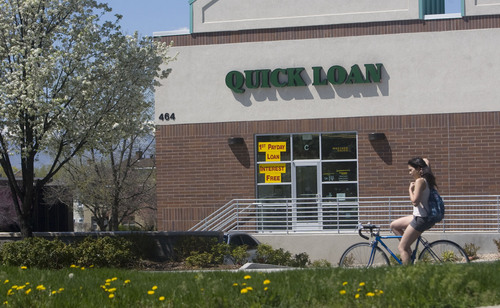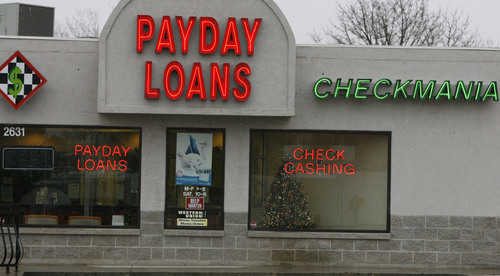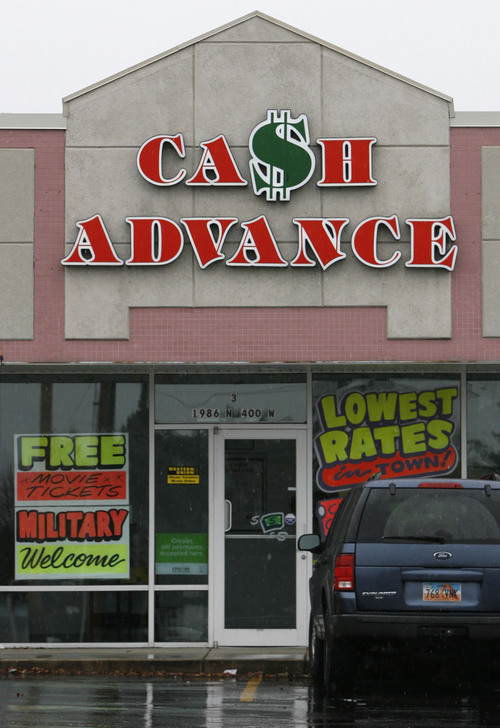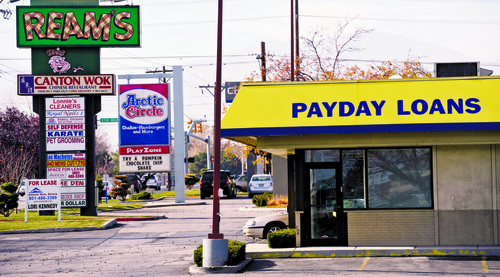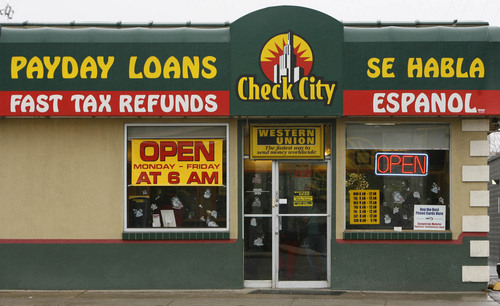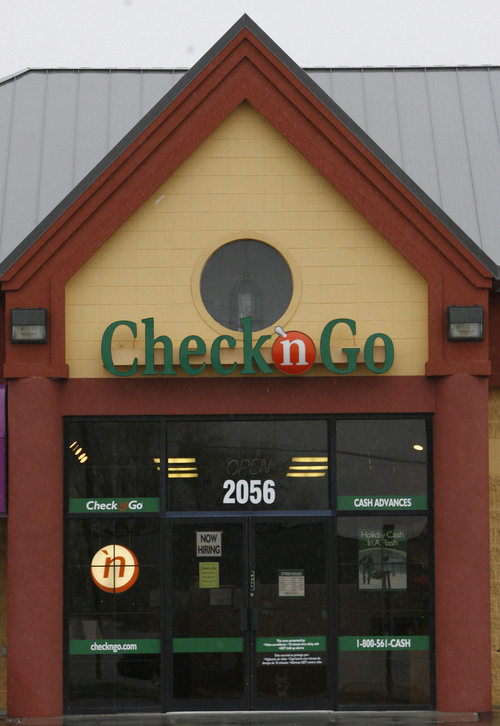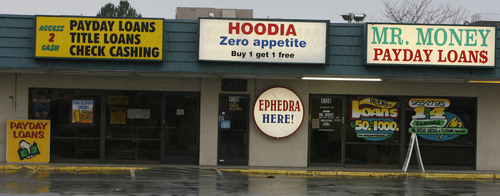This is an archived article that was published on sltrib.com in 2013, and information in the article may be outdated. It is provided only for personal research purposes and may not be reprinted.
At least one Utah payday-loan company charged an astronomical 1,564 percent annual interest last year — meaning it collected $30 in interest each week per $100 loaned, according to new state data.
The data also show that Utahns with payday loans required an average of 33 days to pay them off, meaning they had to extend the expensive loans at least twice beyond the original two-week term.
Such statistics — required by a 2010 state law to be compiled by the Utah Department of Financial Institutions from reports filed by lenders — are renewing debate about whether the loans are essentially legalized loan sharking or a good product to help the poor avoid even more expensive alternatives such as check-overdraft charges or fees to reconnect utilities.
Payday loans usually are issued for two weeks — until a person's next paycheck — for relatively small amounts at high rates. New state data say the average loan is for $358, and charges an average 473.52 percent annual interest rate. They can be renewed for up to 10 weeks, after which state law prohibits continuing to add interest. But people sometimes take out new loans to avoid overdraft fees on checks issued to secure the original loan.
"Payday lenders have continually told legislators that people can afford these loans, and that most people pay them off on time. This data shows that's simply not true. They trap people so that they have a hard time escaping the high interest they can't afford," said Linda Hilton, director of the Coalition of Religious Communities, which helps and advocates for the poor.
On the other hand, Frank Pignanelli, lawyer/lobbyist for the Utah Consumer Lending Association of payday lenders, notes statistics show only nine complaints were filed against Utah payday lenders, "and all of them have been resolved. That's an incredible customer-satisfaction indicator."
—
Steep interest • Hilton and Pignanelli interpret most of the new statistics far differently. Take, for example, how they see the fact that the highest annual interest charged by a Utah payday lender last year was 1,564 percent.
"For someone to lend at over 1,000 percent interest should be criminal," said Hilton, who has led fights against payday lenders in the Legislature. But she notes Utah is among the few states with no limit on interest rates. Utah revoked usury limits in the 1980s. "We keep trying to ask the Legislature to cap loans at maybe 500 percent, but they say that isn't needed. This shows there is still a need."
Pignanelli said charging 1,564 percent interest is rare, and the vast majority of loans are closer to the 473.52 percent rate figured as the average. "That [higher rate] may have been a situation where someone with a poor track record of repaying loans needed something, and they said, 'OK, to cover the risk, you need to pay more.' "
State data show the lowest that a payday lender charged for a loan was 0 percent — free. Pignanelli said, "That is rare, too." He said it was probably a promotion, or perhaps a favor for a good customer.
—
Payoff • Hilton is concerned about the average 33 days that it takes a Utahn to pay off a payday loan.
"That number shows that the majority of loans are not paid at the end of the first loan period, which is in conflict with what payday lenders have been telling the public and the Legislature," she said, adding her experience with the poor suggests lenders intentionally want people to get in over their heads so they must keep renewing or taking out new loans at high interest.
"We see folks who are in the payday-loan trap, usually with more than one loan at a time," she said. "When you owe more than a whole paycheck to a payday lender every two weeks, it's hard to get ahead financially."
While laws do not allow payday lenders to add interest beyond 10 weeks after the loan is made, Hilton said many people tell her that lenders talk them into taking out new loans to avoid overdraft fees on the check they provided originally or to avoid further damage to their credit rating. She said some undocumented immigrants say they are threatened with being reported for possible deportation.
But the Utah Consumer Lending Association tells a different story.
"People are making intelligent decisions about what are cheaper," Pignanelli said, payday loans or the more expensive overdraft fees or fees to reconnect utilities that they may avoid with the loans.
He said a lot of competition exists in the industry in Utah, which tends to hold down rates. "There's a lot of these lenders and it's very easy to shop for interest rates and finance charges." Also the loans are for relatively small amounts — $358 on average, according to the new state data.
—
Growing industry • The new state numbers show Utah has 565 payday loan and title loan stores. That is more than the number of Subway, McDonald's, Burger King, Wendy's and Arctic Circle restaurants in Utah combined.
The state data currently say 25.6 percent of Utah payday-loan customers enter into long-term repayment plans — but that is an error and should instead be about 5.8 percent, although that must still be verified, said Paul Allred, deputy commissioner of the Department of Financial Institutions.
Pignanelli had questioned the original figure, and the department found that one lender had been confused and submitted incorrect data that inflated numbers, Allred said. He said the state will likely amend its report next week.
State law allows customers once a year to stop interest on their loans to allow paying them back without interest over 60 days. Hilton says that use of such extended payment plans again show that many cannot afford the loans and feel trapped.
New data also show that 2,939 people used a provision in state law allowing them to cancel a payday loan within 24 hours without penalty. Hilton hailed that as "wonderful. It shows we are starting to have a more educated consumer who understands how bad payday loans are for them and their family's budget."
Pignanelli said the 24-hour cancellation option — plus allowing customers the option to stop interest and work out extended-payment plans — demonstrates that payday lenders are responsible and well regulated.
"No other financial service, like a bank or credit union," offers the ability for a customer to "walk in and say, 'I need to stop interest and need to pay this down over the next 60 days,' " Pignanelli said. "It is a great service that is available." —
Utah payday loans, by the numbers
Average annual percentage rate charged • 473.52%
Highest interest charged by a payday lender • 1,564%
Average time a customer takes to pay off a loan • 33 days
Average loan amount • $358
Number of payday-loan stores in Utah: 565
Source: Utah Department of Financial Institutions


